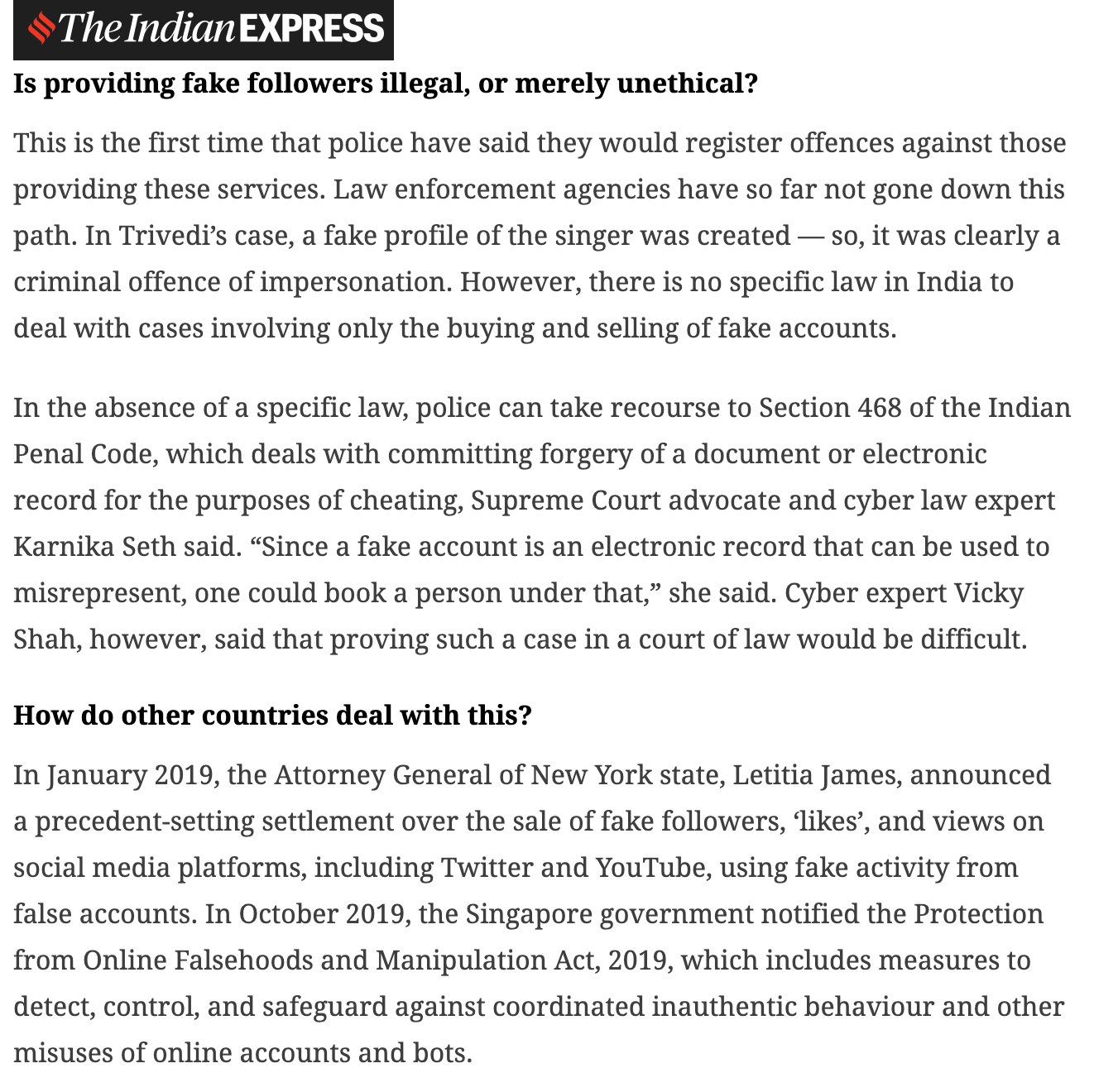
Rapper Badshah, to paying a company Rs.72 lakhs, including 18% service tax (GST, I presume) to ‘generate’ social media views so that he can claim the world record for most views on YouTube within 24 hours.

In the Mumbai Mirror story that reported this, Badshah himself mouths PR-speak and doesn’t confess anything. The cops have claimed that he did (which he could have, to them).
The same page in Mumbai Mirror about singer Bhoomi Trivedi’s police complaint that someone had impersonated her online, using her photos and details to create a profile.

The people indicted in both cases are different. Both seem to be providing the ‘service’ of fake followers and Likes. But, in the latter, there’s also the issue of impersonating a real person.
The latter’s lawyer has put forth an interesting argument in support of her client: faking Likes or followers is not legally a crime. It can only be an unethical act.
This seems quite logical! You and I can frown all we want on Badshah boosting his ego and creating a PR-able world record using fake Likes, but if there is no legal precedence to term it wrong, in India, then he can get away with it. It is .

Badshah is not alone in this. Many stories have been written about how India’s leading politicians have many fake followers, sometimes almost half of their entire so-called following.
Why online? Look at offline! One of the most common methods in political rallies and campaigning is to fill the stadium/venue with ‘heads’ – people who have no clue what is happening on stage, but are lured with money, alcohol and food. They are fake listeners, offline, to an event. Is this legally wrong? Of course not. Ethically wrong? Indeed.
Badshah is using the bandwagon effect to boost his profile. The world record could be added to his list of achievements and together with his other, actual achievements, they could collectively improve his bargaining power with brands and agencies, for promotions.
Film producers in India use it all the time – when they claim their movie is a Rs.100 crore film, they are indirectly implying that since so many people have seen it, the film must be really that good. And that sends a FOMO sign to others who may not have seen it. If the Rs.100 crores were legitimately earned (and not fudged accounting, which is illegal), then this is a perfectly good way to create FOMO.
But in Badshah’s case, he did the fudged-accounting equivalent online to get his “Rs.100 crores”, that is, the world record, using fake views and Likes.
While impersonating a real person by creating a fake profile without their knowledge has a clear legal implication, creating Likes and followers out of non-existent people (bots) is not legally wrong yet.
Boosting one’s own or a brand’s social ‘profile’ with fake followers and Likes could be argued as pointless and vacuous, and is not brand building at all. But we also live in a time when people believe a 2-line forwarded message on WhatsApp to form an opinion and don’t have the impetus or patience to find out the truth behind it! In such times, all we’d bother is how many Likes a video has and jump to the conclusion that it must be a very popular video. Or look at someone’s social media handle, see the number of followers and believe that person to be wildly popular (like seeing a packed venue and believe the politician to be very popular).
Politicians, agencies, brands and celebrities like Badshah are merely using our own lack of diligence and disinterest in knowing the context or details. They monetize our lack of critical questioning and accepting what we see superficially. To be fair, there are no easy ways to figure inflated numbers on social media, but there are enough ways one can know the facts and details on the news that we stumble upon on WhatsApp.
We do that because we have so much to consume online, an endless stream of things to gawk at. As we move quickly between the many wonders online, we also form opinions on some of the brands and people based solely on the numbers. And when some of those numbers seem artificially inflated, we do not bother to question them.
This goes beyond numbers too, to even facts. When politicians claim something, it is the media’s responsibility to counter-question them on those claims and get to the facts. But if plaint media play along with the claims and report the politicians’ word alone, our attention-deficit helps the politicians too – the media doesn’t question them, we don’t question what we read online, either on media or that forward from a friend and assume something about the claim, and the politician(s), that could be based on falsehood.
Politicians use and thrive in our lack of critical faculties. Badshah did too briefly, before he was caught. He could get away with it too since there is no legal precedence in India.
In the US, selling fake Likes and followers was ruled to be illegal, last year, in a landmark case. The ruling clearly said, “Anyone profiting off of deception and impersonation is breaking the law”.

The case before Mumbai Police now would perhaps pave way for a legal precedence in India too, though it would affect the egos and follower numbers of several of our stars and politicians!
